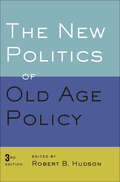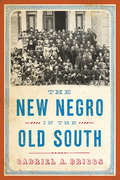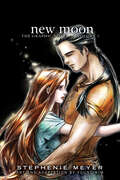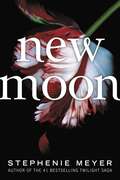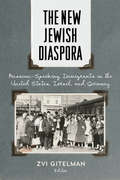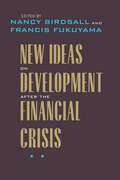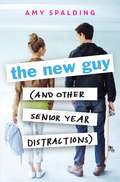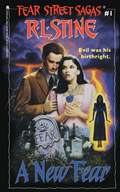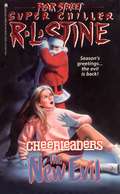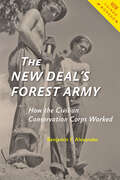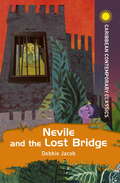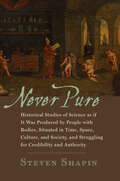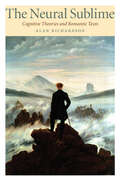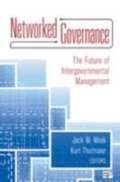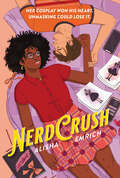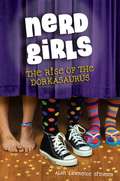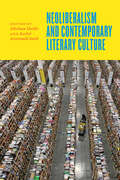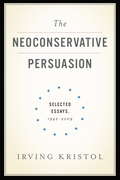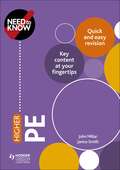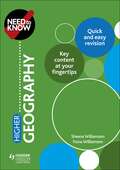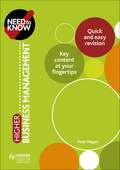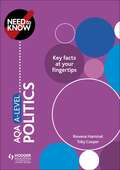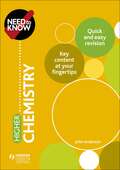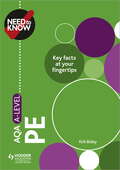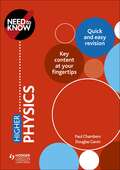- Table View
- List View
The New Politics of Old Age Policy
by Robert B. HudsonA comprehensive overview of current aging policies.As the average age of the U.S. population continues to increase, age-related policies have come under intense scrutiny, sparking heated debates. In the past, older people were seen as a frail, dependent population, but major policies enacted or expanded on their behalf have made them major players in electoral and interest-group politics. This thoroughly revised and updated edition of Robert B. Hudson’s The New Politics of Old Age Policy not only explains the politics behind the country’s age-based programs and describes how those programs work but also assesses how well—or poorly—they meet the growing and changing needs of older Americans. Essays by leading experts in political science, sociology, law, social work, and gerontology address, among other things, theoretical approaches to age-based policy; population dynamics and the impact of growing diversity within the older population; and national, state, and local issues associated with major age-based programs. More than any other source, this book presents the most current information on growing older in the United States, including in-depth analyses of Social Security, Medicare, Medicaid, housing initiatives, the Older Americans Act, the Age Discrimination in Employment Act, and tax policy.Detailed new chapters focus on financial security and retirement in the context of the Great Recession, diversity and inequality in aging populations, and implications of the Affordable Care Act. Scholars, students, and policymakers will appreciate the volume’s timely overview of the evolution of aging policy.
The New Negro in the Old South
by Gabriel A. BriggsStandard narratives of early twentieth-century African American history credit the Great Migration of southern blacks to northern metropolises for the emergence of the New Negro, an educated, upwardly mobile sophisticate very different from his forebears. Yet this conventional history overlooks the cultural accomplishments of an earlier generation, in the black communities that flourished within southern cities immediately after Reconstruction. In this groundbreaking historical study, Gabriel A. Briggs makes the compelling case that the New Negro first emerged long before the Great Migration to the North. The New Negro in the Old South reconstructs the vibrant black community that developed in Nashville after the Civil War, demonstrating how it played a pivotal role in shaping the economic, intellectual, social, and political lives of African Americans in subsequent decades. Drawing from extensive archival research, Briggs investigates what made Nashville so unique and reveals how it served as a formative environment for major black intellectuals like Sutton Griggs and W.E.B. Du Bois. The New Negro in the Old South makes the past come alive as it vividly recounts little-remembered episodes in black history, from the migration of Colored Infantry veterans in the late 1860s to the Fisk University protests of 1925. Along the way, it gives readers a new appreciation for the sophistication, determination, and bravery of African Americans in the decades between the Civil War and the Harlem Renaissance.
New Moon: The Graphic Novel, Vol. 1 (The Twilight Saga #3)
by Stephenie MeyerIn the first installment of New Moon, Bella and Edward find themselves facing new obstacles, including a devastating separation, the mysterious appearance of dangerous wolves roaming the forest in Forks, a terrifying threat of revenge from a female vampire and a deliciously sinister encounter with Italy's reigning royal family of vampires: the Volturi.
New Moon (The Twilight Saga #2)
by Stephenie MeyerFrom evil vampires to a mysterious pack of wolves, new threats of danger and vengeance test Bella and Edward's romance in the second book of the irresistible Twilight saga.For Bella Swan, there is one thing more important than life itself: Edward Cullen. But being in love with a vampire is even more dangerous than Bella could ever have imagined. Edward has already rescued Bella from the clutches of one evil vampire, but now, as their daring relationship threatens all that is near and dear to them, they realize their troubles may be just beginning.Bella and Edward face a devastating separation, the mysterious appearance of dangerous wolves roaming the forest in Forks, a terrifying threat of revenge from a female vampire and a deliciously sinister encounter with Italy's reigning royal family of vampires, the Volturi.Passionate, riveting, and full of surprising twists and turns, this vampire love saga is well on its way to literary immortality.It's here! #1 bestselling author Stephenie Meyer makes a triumphant return to the world of Twilight with the highly anticipated companion, Midnight Sun: the iconic love story of Bella and Edward told from the vampire's point of view."People do not want to just read Meyer's books; they want to climb inside them and live there." -- Time"A literary phenomenon." -- The New York Times
The New Jewish Diaspora: Russian-Speaking Immigrants in the United States, Israel, and Germany
by Sveta Roberman Uzi Rebhun Jonathan Dekel-Chen Adrian Wanner Nelly Elias Mikhail Krutikov Steven J. Gold Mark Tolts Hannah Pollin-Galay Julia Lerner Marina Sapritsky Zvi Gitelman Elena Nosenko-Shtein Olena Bagno-Moldavski Stephanie Sandler Anna Shternshis Eliezer Ben-Rafael Gur Ofer Yaacov Ro'IIn 1900 over five million Jews lived in the Russian empire; today, there are four times as many Russian-speaking Jews residing outside the former Soviet Union than there are in that region. The New Jewish Diaspora is the first English-language study of the Russian-speaking Jewish diaspora. This migration has made deep marks on the social, cultural, and political terrain of many countries, in particular the United States, Israel, and Germany. The contributors examine the varied ways these immigrants have adapted to new environments, while identifying the common cultural bonds that continue to unite them. Assembling an international array of experts on the Soviet and post-Soviet Jewish diaspora, the book makes room for a wide range of scholarly approaches, allowing readers to appreciate the significance of this migration from many different angles. Some chapters offer data-driven analyses that seek to quantify the impact Russian-speaking Jewish populations are making in their adoptive countries and their adaptations there. Others take a more ethnographic approach, using interviews and observations to determine how these immigrants integrate their old traditions and affiliations into their new identities. Further chapters examine how, despite the oceans separating them, members of this diaspora form imagined communities within cyberspace and through literature, enabling them to keep their shared culture alive. Above all, the scholars in The New Jewish Diaspora place the migration of Russian-speaking Jews in its historical and social contexts, showing where it fits within the larger historic saga of the Jewish diaspora, exploring its dynamic engagement with the contemporary world, and pointing to future paths these immigrants and their descendants might follow.
New Ideas on Development after the Financial Crisis (Forum on Constructive Capitalism)
by Nancy Birdsall, Francis FukuyamaThe global financial crisis of 2008–9 has changed the way people around the world think about development. The market-friendly, lightly regulated model of capitalism promoted by the United States is now at risk, and development thinking worldwide is at something of an impasse. Editors Nancy Birdsall and Francis Fukuyama bring together leading scholars to explore the implications of the global financial crisis on existing and future development strategies.In addressing this issue, the contributors contemplate three central questions: What effect has the crisis had on current ideas in development thinking? How has it affected and how will it affect economic policy and political realities in Latin America and Asia, including China and India? Will the financial collapse reinforce shifts in geopolitical power and influence, and in what form? Essays answering these questions identify themes that are essential as economic and political leaders address future challenges of development.To help move beyond this time of global economic turmoil, the contributors—the foremost minds in the field of international development—offer innovative ideas about stabilizing the international economy and promoting global development strategies. Contributors: Nancy Birdsall, Center for Global Development; Michael Clemens, Center for Global Development; Kemal Derviş, Brookings Institution; Larry Diamond, Stanford University; Francis Fukuyama, Stanford University; Peter S. Heller, Johns Hopkins University; Yasheng Huang, Massachusetts Institute of Technology; Justin Yifu Lin, World Bank; José Antonio Ocampo, Columbia University; Mitchell A. Orenstein, Johns Hopkins University; Minxin Pei, Claremont McKenna College; Lant Pritchett, Harvard University; Liliana Rojas-Suarez, Center for Global Development; Arvid Subramanian, Johns Hopkins University
The New Guy (and Other Senior Year Distractions)
by Amy SpaldingFilled with romance, rivalry, and passive-aggressive dog walking, Amy Spalding delivers a hilariously relatable story about how even the best-laid plans sometimes need to be rewritten.What's the only thing that could derail overachiever Jules's perfect senior year? Alex Powell--former member of boy-band sensation Chaos 4 All and newest transfer to Eagle Vista Academy. Alex seems cool enough when he starts spending time with Jules. In fact, he turns out to be quite the romantic (not to mention a killer kisser). And after getting over the initial shock that someone like Alex might actually like like her, Jules accepts that having a boyfriend could be a nice addition to her packed schedule. That is, until Alex commits the ultimate betrayal, which threatens to ruin her high school career, and possibly her entire future. This. Means. War.
A New Fear: A New Fear; House Of Whispers; Forbidden Secrets (Fear Street Saga #1)
by R.L. StineThe Fear name brings fortune...and doom. The dark power of the Fear family consumes all those connected with it. The Fears. Those they love -- and hate. The entire town of Shadyside. All are tainted forever by the evil of the family's curse. No one can escape. Nora Goode and Daniel Fear hoped to end the curse of the Fear family. But on their wedding day, a horrible fire swept through the Fear mansion, taking the life of every member of the doomed family. Except one. A new Fear. The child of Nora and Daniel. Will he be able to live his life untouched by the evil of his family? Or will the dark forces claim yet another Fear for their own?
The New Evil (Fear Street Cheerleaders)
by R.L. StineCorky and the Shadyside cheerleaders are sure that the evil spirit is destroyed. The terror is over. Then Hannah is mysteriously thrown through the car window. And Naomi is nearly burned to death. One horrifying accident after another. And now Corky can no longer keep her greatest fear to herself—the evil is back! But where is it? Corky, Kimmy, and Debra aren’t waiting to find out. They have a plan to draw the evil out and destroy it for good. Unless, of course, the evil destroys them first...
The New Deal's Forest Army: How the Civilian Conservation Corps Worked (How Things Worked)
by Benjamin F. AlexanderHow the Civilian Conservation Corps constructed, rejuvenated, and protected American forests and parks at the height of the Great Depression.Propelled by the unprecedented poverty of the Great Depression, President Franklin D. Roosevelt established an array of massive public works programs designed to provide direct relief to America’s poor and unemployed. The New Deal’s most tangible legacy may be the Civilian Conservation Corps’s network of parks, national forests, scenic roadways, and picnic shelters that still mark the country’s landscape. CCC enrollees, most of them unmarried young men, lived in camps run by the Army and worked hard for wages (most of which they had to send home to their families) to preserve America’s natural treasures. In The New Deal’s Forest Army, Benjamin F. Alexander chronicles how the corps came about, the process applicants went through to get in, and what jobs they actually did. He also explains how the camps and the work sites were run, how enrollees spent their leisure time, and how World War II brought the CCC to its end. Connecting the story of the CCC with the Roosevelt administration’s larger initiatives, Alexander describes how FDR’s policies constituted a mixed blessing for African Americans who, even while singled out for harsh treatment, benefited enough from the New Deal to become an increasingly strong part of the electorate behind the Democratic Party. The CCC was the only large-scale employment program whose existence FDR foreshadowed in speeches during the 1932 campaign—and the dearest to his heart throughout the decade that it lasted. Alexander reveals how the work itself left a lasting imprint on the country’s terrain as the enrollees planted trees, fought forest fires, landscaped public parks, restored historic battlegrounds, and constructed dams and terraces to prevent floods. A uniquely detailed exploration of life in the CCC, The New Deal’s Forest Army compellingly demonstrates how one New Deal program changed America and gave birth to both contemporary forestry and the modern environmental movement.
Nevile and the Lost Bridge
by Debbie JacobThere have been many great and enduring works of literature by Caribbean authors over the last century. The Caribbean Contemporary Classics collection celebrates these deep and vibrant stories, overflowing with life and acute observations about society.In the year 2222, Neville and his friends Nina and A.T. are elite bridge builders in the province of Aribbea, where children go to work, adults go to school, and everyone is ruled by a tyrannical king. No-one remembers what life was like before the calamitous event which brought the king to power, and enabled him to lock up all secrets and memory in his own library. Aribbeans now have no memory, and no understanding of the world outside the bridges on which they live. When Neville, Nina and A.T. find themselves plunging from a bridge to the land and sea below, they have no idea what will befall them. Sometimes together, sometimes apart, each must make his or her way through the tests and challenges which await them, to find their true place and to begin to recover their history. Accompanied by a varied cast of companions, they encounter Pierre the Bacoo, Papa Bois, the rasta Hunn Dread, Hanuman the monkey and the last dog in Arribea. This motley crew succeeds in posing the first real challenge to his rule which the king has ever faced. What does friendship and loyalty mean? How do we know when we are safe, and what makes us so? Who can we trust?
Never Pure: Historical Studies of Science as if It Was Produced by People with Bodies, Situated in Time, Space, Culture, and Society, and Struggling for Credibility and Authority
by Steven ShapinSteven Shapin argues that science, for all its immense authority and power, is and always has been a human endeavor, subject to human capacities and limits. Put simply, science has never been pure. To be human is to err, and we understand science better when we recognize it as the laborious achievement of fallible, imperfect, and historically situated human beings.Shapin’s essays collected here include reflections on the historical relationships between science and common sense, between science and modernity, and between science and the moral order. They explore the relevance of physical and social settings in the making of scientific knowledge, the methods appropriate to understanding science historically, dietetics as a compelling site for historical inquiry, the identity of those who have made scientific knowledge, and the means by which science has acquired credibility and authority.This wide-ranging and intensely interdisciplinary collection by one of the most distinguished historians and sociologists of science represents some of the leading edges of change in the scholarly understanding of science over the past several decades.
The Neural Sublime: Cognitive Theories and Romantic Texts
by Alan RichardsonWinner, 2011 Alpha Sigma Nu Book Award in Literature and Fine ArtsThe Neural Sublime brings recent work in cognitive neuroscience to bear on some famously vexed issues in British Romantic studies. In exciting and unprecedented ways, Alan Richardson demonstrates how developments in the neurosciences can transform the study of literary history. Richardson presents six exemplary studies, each exploring a different intersection of Romanticism and the sciences of the mind and brain: the experience of the sublime and the neuroscience of illusion; the Romantic imagination and visual imaging; the figure of apostrophe and linguistic theory; fictional representations of the mind and "theory of mind" theory; depictions of sibling incest and neo-Darwinian theories of mental behavior; and representations of female speech and cognitive developmental psychology. Richardson’s insightful analysis opens fresh perspectives on British Romanticism, pointing scholars to new developments in cognitive literary studies. He combines elements of new historicist analysis with original—and much-needed—models for understanding language, subjectivity, and social behavior. Far from signaling a departure from the prevalent critical approaches of new historicism, Richardson argues, cognitive theory presents an essential complement to them.The Neural Sublime features an array of cognitive and neuroscientific approaches, providing an engaging and readable introduction to the emergent field of cognitive literary studies.
Networked Governance: The Future Of Intergovernmental Management
by Jack W. Meek Kurt ThurmaierIn this unique contributed volume that features chapters written by top scholars paired with practitioner responses, students can see just how much the landscape of intergovernmental relations has evolved in recent years, with diminishing vertical flows of resources, and increased horizontal flows in the form of cross-jurisdictional and interlocal collaboration. Government at all levels must respond to increasing demands in both of these dimensions giving these contributors plenty to say about the future of intergovernmental management in such areas as: #65533; the changing role of managers, #65533; disaster response, #65533; social welfare spending, #65533; cross-boundary management, #65533; regional public-private partnerships, and #65533; sustainable cities. Contributors include Robert Agranoff, J. Edwin Benton, Beverly A. Cigler, Brian K. Collins, Mauricio Covarrubias, Raymond W. Cox II, John Kincaid, Christopher Koliba, William Lester, David Y. Miller, Beryl A. Radin, Juan M. Romero, and Eric S. Zeemering.
NerdCrush
by Alisha EmrichHappily Ever Afters meets You've Got Mail in this geeky, Black Girl Magic filled debut romance about cosplay and finding the courage to be yourself. Ramona Lambert is a typical shy, artistic sixteen-year-old. She has a best friend whom she&’s known since they were in diapers; parents who love her; a love for cosplay; and a crush on the cute boy in her class. The only problem? Her best friend moved away; her parents don't quite understand her love of cosplay; and she is pretty sure her crush has no idea she exists. To escape her troubles, Ramona turns to cosplay and her original character, Rel, who gives her the confidence and freedom that she lacks in real life. Embracing this confidence, she decides to strike up an email conversation with her crush, Caleb Wolfe, from her cosplay account in the hopes getting to know him . . . and maybe win his heart. Then as Caleb and Ramona are swept up in their emails back and forth to each other, and Ramona falls even harder as he opens up about his hopes, insecurities, and his own geeky loves. However, as Caleb starts to grow closer and closer to Rel, he also strikes up a friendship with Ramona, who knows she can't keep the truth about Rel from Caleb but isn't sure she is ready to risk losing him. With an important cosplay convention coming up and the anxiety of her double-life weighing on her, Ramona has to decide if she&’ll hide behind her cosplay character forever or take the chance and let Caleb see the real her--because he might actually like her for who she is.
Nerd Girls: The Rise of the Dorkasaurus (Nerd Girls Ser. #2)
by Alan Lawrence SitomerMaureen, a thirteen-year-old self-proclaimed dork-a-saurus, is totally addicted to cupcakes and hot dogs and thinks that her body looks like a baked potato. Allergy-plagued Alice can't touch a mango without breaking out in a rash, and if she eats wheat, her vision goes blurry. Klutzy to the extreme, Barbara is a beanpole who often embarrasses herself in front of the whole school. These outcasts don't have much in common--other than the fact that they are often targets of the ThreePees: the Pretty, Popular, Perfect girls who rule the school. But one day Maureen discovers that the ThreePees are planning to sit next to Allergy Alice in the cafeteria and eat peanut-butter-and-banana sandwiches on whole wheat toast with mango marmalade for lunch. And Maureen decides that it's time to topple the eight-grade social regime. She joins forces with Alice and Barbara and the Nerd Girls enter the school talent show, determined to take the crown from the ThreePees. Will their routine be enough to de-throne the popular crowd? Or will their plan backfire and shake their hold on the bottom rung of the social ladder?
Neoliberalism and Contemporary Literary Culture
by Mitchum Huehls; Rachel Greenwald SmithHow has the pervasive spread of free market thinking affected contemporary literature?Neoliberalism has been a buzzword in literary studies for well over a decade, but its meaning remains ambiguous and its salience contentious. In Neoliberalism and Contemporary Literary Culture, Mitchum Huehls and Rachel Greenwald Smith offer a wide-ranging exploration of contemporary literature through the lens of neoliberalism’s economic, social, and cultural ascendance. Bringing together accessible and provocative essays from top literary scholars, this innovative collection examines neoliberalism’s influence on literary theory and methodology, literary form, literary representation, and literary institutions. A four-phase approach to the historical emergence of neoliberalism from the early 1970s to the present helps to clarify the complexity of the relationship between neoliberalism and literary culture. Layering that history over the diverse changes in a US-Anglo literary field that has moved away from postmodern forms and sensibilities, the book argues that many literary developments—including the return to realism, the rise of the memoir, the embrace of New Materialist theory, and the pursuit of aesthetic autonomy—make more coherent sense when viewed in light of neoliberalism’s ever-increasing expansion into the cultural sphere.The essays gathered here engage a diverse range of theorists, including Michel Foucault, Wendy Brown, Giorgio Agamben, Bruno Latour, Maurice Merleau-Ponty, Gary Becker, and Eve Sedgwick to address the reciprocal relationship between neoliberalism and conceptual fields such as biopolitics, affect, phenomenology, ecology, and new materialist ontology. These theoretical perspectives are complemented by innovative readings of contemporary works of literature by writers such as Jennifer Egan, Ben Lerner, Gillian Flynn, Teju Cole, Jonathan Franzen, Chimamanda Ngozi Adichie, Salvador Plascencia, E. L. James, Lisa Robertson, Kenneth Goldsmith, and many others. Neoliberalism and Contemporary Literary Culture is essential reading for anyone invested in the ever-changing state of literary culture.
The Neoconservative Persuasion: Selected Essays, 1942-2009
by Irving KristolFrom the late founder of neoconservatism, a wide-ranging collection of his best writings
Need to Know: Higher PE
by John Millar Janice SmithExam board: SQALevel: HigherSubject: PEFirst teaching: September 2018First exams: Summer 2019 What do you really need to know for the SQA Higher PE exam?This revision guide covers the essentials in less than 100 pages, so it's perfect for early exam preparation or last-minute revision.- Find key content at your fingertips with quick summaries of the factors, concepts and terminology that you need to understand- Get a better grade in your exam with tips on exam technique, mistakes to avoid and important things to remember- Revise and practise using end-of-topic questions and in-depth questions at the end of each section - with answers provided online - Benefit from the knowledge of experienced teachers and examiners John Millar and Janice Smith
Need to Know: Higher Geography
by Sheena Williamson Fiona WilliamsonExam board: SQALevel: HigherSubject: GeographyFirst teaching: September 2018 First exams: Summer 2019 What do you really need to know for the SQA Higher Geography exam?This revision guide covers the essentials in less than 90 pages, so it's perfect for early exam preparation or last-minute revision.- Find key content at your fingertips with quick summaries of the processes, issues and terminology that you need to understand- Get a better grade in your exam with tips on exam technique, mistakes to avoid and important things to remember- Revise and practise using end-of-topic questions and synoptic questions at the end of each section - with answers provided onlineThis book covers all topics except for Energy from the Global Issues component.
Need to Know: Higher Business Management
by Peter HaganExam board: SQALevel: HigherSubject: Business ManagementFirst teaching: September 2018 First exams: Summer 2019 What do you really need to know for the SQA Higher Business Management exam?This revision guide covers the essentials in just 104 pages, so it's perfect for early exam preparation or last-minute revision.- Find key content at your fingertips with quick summaries of the theories, concepts and terminology that you need to understand- Get a better grade in your exam with tips on exam technique, mistakes to avoid and important things to remember- Revise and practise using end-of-topic questions and in-depth questions at the end of each section - with answers provided online- Benefit from the knowledge of experienced teacher, author and examiner Peter Hagan
Need to Know: AQA A-level Politics
by Rowena Hammal Toby CooperKey facts at your fingertips:- Check key content when you need it- Review your understanding- Use quick tips for success- Improve your exam performance- Dip in for support throughout your courseFind what you need to know for AQA A-level Politics when you need it. Written by experienced authors Rowena Hammal and Toby Cooper, this guide will help you to:- Build on your learning throughout the course by reinforcing the key facts, terms and concepts from the specification- Put what you learn into context with topic links and exam tips specific to Higher (subject)- Revise with confidence using the 'Do you know' questions at the end of each topic and synoptic questions at the end of each section. Answers are online at www.hoddereducation.co.uk/needtoknow/answers
Need to Know: Higher Chemistry Epub
by John AndersonExam board: SQALevel: HigherSubject: ChemistryFirst teaching: September 2018 First exams: Summer 2019What do you really need to know for the SQA Higher Chemistry exam?This revision guide covers the essentials in less than 100 pages, so it's perfect for early exam preparation or last-minute revision.- Find key content at your fingertips with quick summaries of the concepts, processes and terminology that you need to understand- Get a better grade in your exam with tips on exam technique, mistakes to avoid and important things to remember- Revise and practise using end-of-topic questions and in-depth questions at the end of each section - with answers provided online - Benefit from the knowledge of experienced teacher, author and examiner John Anderson
Need to Know: Aqa A-level Pe Epub
by Kirk Bizley Ross HowittExam board: AQALevel: A-levelSubject: PEFirst teaching: September 2016First exams: Summer 2017 (AS); Summer 2018 (A-level)Find what you need to know, when you need it, with key facts at your fingertips for AQA A-level PE.Keep this course companion by your side throughout your A-levels so you can check content, review your understanding, use quick tips for success and improve your exam performance.Written by an experienced teacher, author and examiner, this book will help you to:- Build on your learning throughout the course by reinforcing the key facts, terms and concepts from the AQA A-level PE specification- Put the content into context with synoptic links between topics and exam tips on technique, mistakes to avoid and things to remember- Revise with confidence using 'Do you know?' questions at the end of each topic and synoptic questions at the end of each section
Need to Know: Higher Physics Epub
by Paul Chambers Douglas GavinExam board: SQALevel: HigherSubject: PhysicsFirst teaching: September 2018First exams: Summer 2019What do you really need to know for the SQA Higher Physics exam?This revision guide covers the essentials in less than 100 pages, so it's perfect for early exam preparation or last-minute revision.- Find key content at your fingertips with quick summaries of the concepts, issues and terminology that you need to understand- Get a better grade in your exam with tips on exam technique, mistakes to avoid and important things to remember- Revise and practise using end-of-topic questions and in-depth questions at the end of each section - with answers provided online
